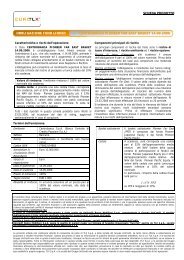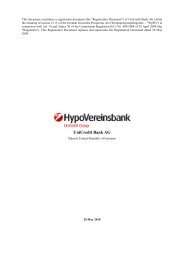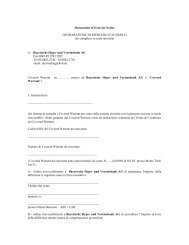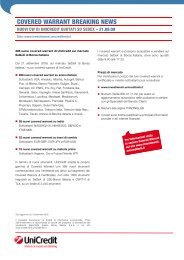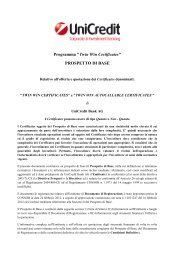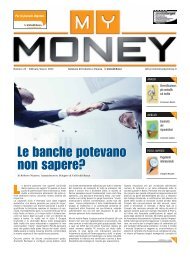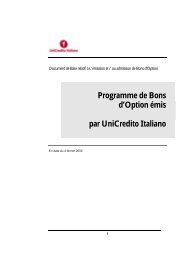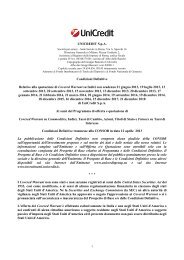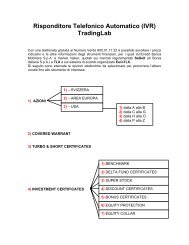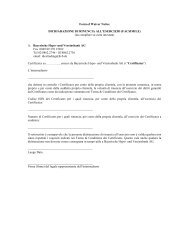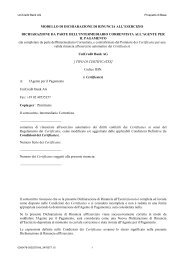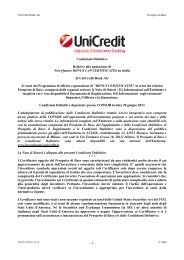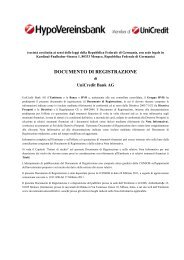HVB DIP 2006-Title Summaryv13.DOC - UniCredit
HVB DIP 2006-Title Summaryv13.DOC - UniCredit
HVB DIP 2006-Title Summaryv13.DOC - UniCredit
You also want an ePaper? Increase the reach of your titles
YUMPU automatically turns print PDFs into web optimized ePapers that Google loves.
36<br />
Risks relating to Bayerische Hypo- und Vereinsbank AG<br />
Risks Related to the Business Combination of the <strong>UniCredit</strong> Group and the <strong>HVB</strong> Group<br />
Although the HypoVereinsbank Offer and the Bank Austria Offer were successfully completed, regulatory authorities<br />
in the remaining countries, such as Poland may inter alia impose conditions disadvantageous for the<br />
strategic goals aimed at by the parties of the Business Combination Agreement. This may prevent also HypoVereinsbank<br />
from reaching the strategic and financial goals envisaged. Regarding the HypoVereinsbank Offer and<br />
the Bank Austria Offer all regulatory approvals could be obtained. The implementation of the business model<br />
and the reaching of the targets aimed for are subject to the risks and uncertainties that generally apply to such<br />
transactions. Higher uncertainty until complete and successful implementation of a new business model and, in<br />
turn, the performance and financial position of <strong>HVB</strong> Group may diverge substantially from the targets set.<br />
Should <strong>HVB</strong> Group not achieve its financial goals, this could impact adversely on the future earnings of HypoVereinsbank<br />
and cast general doubt on the ability of <strong>HVB</strong> Group to achieve its strategic objectives and may<br />
also result in a deterioration of <strong>HVB</strong> Group ratings. See “A Deterioration of <strong>HVB</strong> Group’s Ratings Would Pose<br />
Significant Risks for <strong>HVB</strong> Group’s Business".<br />
Unforeseen difficulties in connection with the Business Combination of <strong>UniCredit</strong> Group and <strong>HVB</strong> Group<br />
may have a material adverse effect on <strong>UniCredit</strong> Group’s and <strong>HVB</strong> Group’s business, financial condition<br />
and results of operations.<br />
The Business Combination will result in the integration of two large banking groups that were previously managed<br />
and operated independently and as competitors. This complex integration poses specific challenges that will<br />
expose the newly formed Group and <strong>HVB</strong> Group to certain risks, including the following:<br />
• Uncertainties of achieving synergies. Although HypoVereinsbank expects the Business Combination to<br />
cre-ate synergies, the integration of two large banking groups based in different countries, with differing<br />
cultural backgrounds, business cultures, operating languages and compensation structures as well as legal<br />
frame-work, which are active throughout a large geographical area, presents significant managerial challenges.<br />
There can be no assurance that this integration, and the synergies expected to result from the integration,<br />
will be achieved as rapidly or to the extent currently anticipated.<br />
• Complex harmonization of <strong>UniCredit</strong> Group’s and <strong>HVB</strong> Group’s IT systems. Harmonizing <strong>UniCredit</strong><br />
Group’s and <strong>HVB</strong> Group’s IT systems to create a consistent IT architecture across the combined group<br />
poses specific challenges and risks to <strong>HVB</strong> Group.<br />
• Complex integration of <strong>UniCredit</strong> Group’s and <strong>HVB</strong> Group’s risk management systems. <strong>UniCredit</strong><br />
Group and <strong>HVB</strong> Group currently use different methodologies to measure and manage risks. The integration<br />
of the two risk management systems following the Business Combination will likely aggravate the<br />
risk of a poten-tial failure or inadequacy of the combined group’s risk management systems, in particular<br />
during the initial integration phase.<br />
• Diversion of management resources to address integration issues. The integration of <strong>UniCredit</strong> Group and<br />
<strong>HVB</strong> Group will require significant time and attention of the combined group’s management. To the extent<br />
that integration issues divert attention from management’s other responsibilities, <strong>HVB</strong> Group’s business<br />
may be adversely affected.<br />
• Need to communicate effectively with partners and customers. The combined group will need to communi-cate<br />
effectively with its partners and customers so that they understand the expanded range of products<br />
and services offered by the combined group and the relative strengths of such product and services range.<br />
The failure to communicate effectively may result in a failure to exploit opportunities and the loss of e-<br />
xisting business and customers on the side of <strong>HVB</strong> Group.<br />
• Potential loss of key personnel. The combined group will rely on the senior management of <strong>UniCredit</strong><br />
Group and <strong>HVB</strong> Group to successfully integrate the two groups and implement the combined strategy. If<br />
the combined group loses key personnel, it may have more difficulty completing the integration quickly<br />
and in a manner that takes advantages of the respective strengths of <strong>UniCredit</strong> Group and <strong>HVB</strong> Group.<br />
• <strong>UniCredit</strong> Group is supervised by the Bank of Italy and their guidelines may affect the results of <strong>HVB</strong><br />
Group in future.



